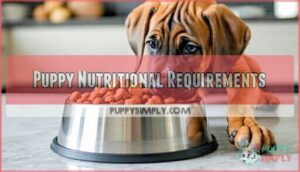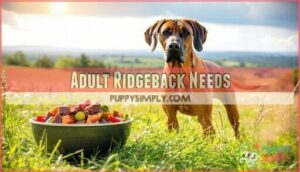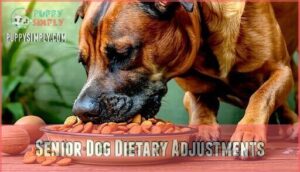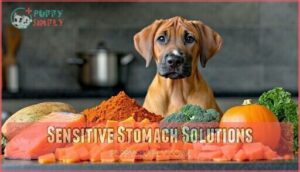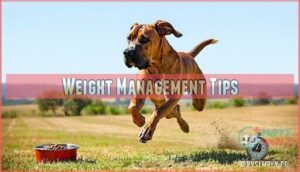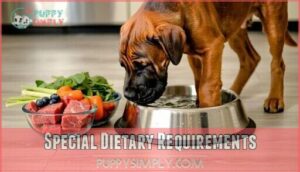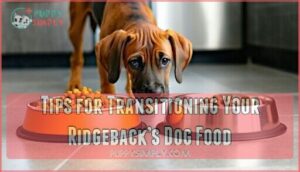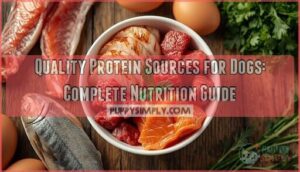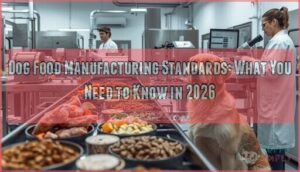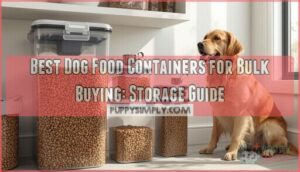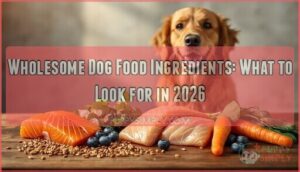This site is supported by our readers. We may earn a commission, at no cost to you, if you purchase through links.

The best dog food for Rhodesian Ridgebacks features lean proteins like chicken or fish, glucosamine for joint health, and controlled portions to prevent bloat—a serious concern for this deep-chested breed.
Look for large-breed formulas with 22-26% protein and avoid grain-heavy options that can trigger sensitivities.
Premium brands like American Journey, Orijen, and Wellness CORE consistently deliver the balanced nutrition these athletic dogs crave.
Your ridgeback’s energy levels and that distinctive ridge both depend on getting the fundamentals right from puppyhood through their golden years.
Table Of Contents
- Key Takeaways
- 10 Best Dog Foods for Rhodesian Ridgebacks
- 1. American Journey Large Breed Chicken Rice Vegetable Dog Food
- 2. Nulo Freestyle Turkey Sweet Potato Puppy Food
- 3. Grain-Free Beef Vegetable Dog Food
- 4. Victor Senior Healthy Weight Dog Food
- 5. Wellness CORE RawRev Wild Game Lamb Dog Food
- 6. Orijen Senior Dog Food
- 7. Purina ProPlan Large Breed Puppy Food
- 8. Blue Buffalo Wilderness Puppy Chicken
- 9. Instinct Raw Boost Puppy Chicken Freeze-Dried
- 10. Nutro Natural Choice Lamb Brown Rice Large Breed Dog Food
- Key Nutritional Needs for Rhodesian Ridgebacks
- Age-Specific Dietary Recommendations
- Managing Common Health Concerns Through Diet
- Tips for Transitioning Your Ridgeback’s Dog Food
- Frequently Asked Questions (FAQs)
- What is the best food for Rhodesian Ridgebacks?
- Do Rhodesian Ridgebacks have sensitive stomachs?
- How many times a day should you feed a Rhodesian Ridgeback?
- Are Rhodesian Ridgebacks difficult dogs?
- How much should Rhodesian Ridgebacks eat daily?
- What foods are toxic to Ridgebacks?
- Can Ridgebacks eat raw food diets safely?
- How often should I feed my Ridgeback?
- What treats work best for Ridgeback training?
- Conclusion
Key Takeaways
- Choose high-protein, large-breed formulas – You’ll want 22-26% protein from quality sources like chicken or fish, plus controlled calcium levels to support proper growth without stressing developing joints.
- Prevent bloat with proper feeding practices – You should feed your Ridgeback twice daily in smaller portions rather than one large meal, since this deep-chested breed is prone to dangerous bloat conditions.
- Look for joint-supporting ingredients – You’ll benefit from foods containing glucosamine and chondroitin to maintain your athletic dog’s joint health throughout their active lifestyle.
- Transition foods gradually over 7-10 days – You can’t switch your Ridgeback’s diet overnight; start with 25% new food mixed with 75% old food and gradually increase the ratio to avoid digestive upset.
10 Best Dog Foods for Rhodesian Ridgebacks
Choosing the right food for your Rhodesian Ridgeback can feel overwhelming with so many options available.
We’ve tested and reviewed ten top-quality dog foods that meet the specific nutritional needs of this active, large breed, to help you make an informed decision with top-quality dog foods.
1. American Journey Large Breed Chicken Rice Vegetable Dog Food
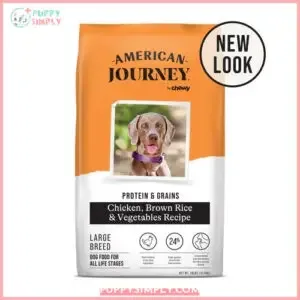
American Journey’s large breed formula delivers quality nutrition at an affordable price point, making it an excellent entry-level choice for your Rhodesian Ridgeback.
The chicken-first ingredient analysis shows real protein sources, while rice provides digestible carbohydrates that support your dog’s energy needs.
Palatability assessment reveals most dogs enjoy the taste, and cost comparison shows significant savings over premium brands without sacrificing essential nutrition.
2. Nulo Freestyle Turkey Sweet Potato Puppy Food
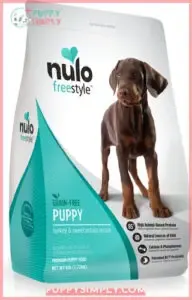
Nulo Freestyle Turkey Sweet Potato Puppy Food delivers premium nutrition that growing ridgeback puppies crave.
This grain-free formula features high-quality turkey as the first ingredient, providing essential protein for muscle development.
The sweet potato base offers digestible carbohydrates while supporting healthy digestion, and Nulo’s commitment to ingredient quality shines through their limited-ingredient approach.
This approach makes Nulo Freestyle Turkey Sweet Potato Puppy Food an excellent choice for ridgeback puppy food needs, providing the necessary support for growth with its grain-free formula.
3. Grain-Free Beef Vegetable Dog Food
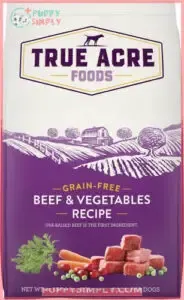
Looking for grain-free benefits for your Ridgeback? This beef protein source delivers excellent digestibility while vegetables add nutritional value.
You’ll appreciate how allergy considerations make this recipe perfect for sensitive stomachs. The grainfree dog food formula supports ideal ridgeback nutrition without common allergens.
Recipe customization allows you to adjust portions based on your dog’s specific ridgeback diet needs, making it versatile for best food ridgebacks require.
4. Victor Senior Healthy Weight Dog Food

Senior Rhodesian Ridgebacks benefit from Victor Senior Healthy Weight Dog Food‘s carefully balanced formula.
This brand reputation speaks volumes through its ingredient analysis featuring reduced calorie content perfect for aging ridgebacks.
The feeding guide guarantees your senior ridgeback food portions support healthy weight management.
Victor’s ridgeback diet formula addresses slower metabolisms while maintaining muscle mass.
Senior benefits include joint support and digestive wellness, making this best food ridgebacks choice ideal for golden years.
5. Wellness CORE RawRev Wild Game Lamb Dog Food
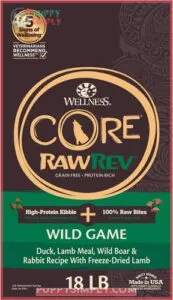
Wild game lamb brings adventure to your Ridgeback’s bowl. This grain-free dog food combines freeze-dried raw pieces with high protein kibble, perfect for active large breed dogs who need sustained energy.
Many owners are choosing holistic options for their pets, which offer higher nutritional value.
Key Benefits for Rhodesian Ridgebacks:
- Raw Inclusion provides natural enzymes and enhanced palatability
- Protein Sources from lamb and wild game support muscle development
- Breed Suitability designed for large, athletic dogs with high energy needs
- Cost Comparison shows premium pricing reflects quality ingredient analysis
6. Orijen Senior Dog Food
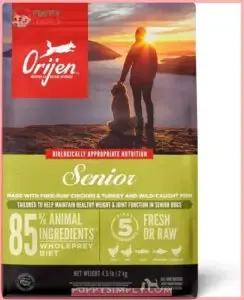
Orijen Ingredients pack serious nutritional punch for your aging Ridgeback.
This high protein dog food delivers 38% protein from fresh regional ingredients, supporting muscle maintenance as your senior companion slows down.
Premium freeze-dried liver coating makes mealtime irresistible.
| Feature | Details | Benefits |
|---|---|---|
| Protein Source | Fresh chicken, turkey, fish | Maintains lean muscle mass |
| Senior Benefits | Glucosamine, chondroitin | Supports joint health |
| Feeding Guidelines | 2-4 cups daily | Portion control for seniors |
| Cost Analysis | $80-90 per bag | Premium pricing justified |
7. Purina ProPlan Large Breed Puppy Food
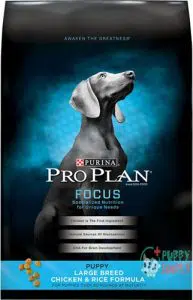
When your Rhodesian Ridgeback puppy’s growing fast, Purina Pro Plan Large Breed Puppy Food delivers controlled nutrition that won’t overwhelm developing joints.
This chicken-first formula contains glucosamine for cartilage support and DHA for brain development.
You’ll appreciate the balanced calcium and phosphorus levels that promote steady growth without rushing bone development.
The 28% protein content builds lean muscle while maintaining ideal body weight.
It’s a veterinarian-recommended choice that many Ridgeback breeders trust for raising healthy, strong puppies, with a formula that supports steady growth.
Best For: Large and giant breed puppies, especially Rhodesian Ridgebacks, needing steady growth, strong joints, and lean muscle.
- High-protein, chicken-first formula with glucosamine supports muscle and healthy joint development.
- Balanced calcium and phosphorus for proper bone growth, plus DHA for brain and vision support.
- Highly rated for taste and digestibility, with probiotics for sensitive stomachs and shiny coats.
- Contains grains (corn, wheat) and poultry by-products, which some owners prefer to avoid.
- Reports of delayed delivery with certain online orders (FedEx).
- Pricier than some store brands, with little difference between in-store and auto-ship prices.
8. Blue Buffalo Wilderness Puppy Chicken
Blue Buffalo Wilderness Puppy Chicken delivers high protein dog food specifically formulated for growing large breed dogs.
This ridgeback feeding guide favorite features deboned chicken as the primary protein source, supporting muscle development during pivotal puppy months.
The ingredient analysis reveals quality nutrition without grains, making it suitable for sensitive stomachs, and the brand reputation and cost comparison favor this option for Rhodesian Ridgeback care.
9. Instinct Raw Boost Puppy Chicken Freeze-Dried
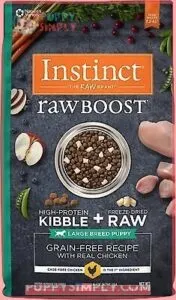
Puppy power-nutrition meets freeze-dried innovation in this premium blend. You’ll find real chicken protein supports your ridgeback’s rapid growth phase while maintaining ingredient quality standards.
- Raw boost analysis shows enhanced digestibility
- Freeze-dried benefits include superior nutrient retention
- Chicken protein source provides essential amino acids
- High protein dog food supports muscle development
- Large breed dog food formula prevents rapid growth issues, which is crucial for rapid growth phase and overall muscle development.
10. Nutro Natural Choice Lamb Brown Rice Large Breed Dog Food
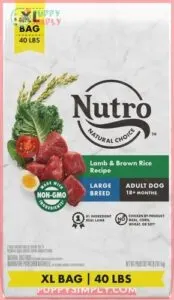
Nutro Natural Choice offers a reliable lamb protein source that’s perfect for Ridgebacks with sensitive stomachs or food allergies.
This large breed formula combines brown rice benefits with natural ingredients, making it an excellent choice for dogs who struggle with chicken-based foods.
The brand’s commitment to wholesome nutrition shines through in this allergy-friendly recipe that supports your Ridgeback’s health issues.
Key Nutritional Needs for Rhodesian Ridgebacks
Your Rhodesian Ridgeback’s nutritional foundation starts with understanding their unique metabolic blueprint. These athletic hounds need carefully balanced nutrition to fuel their energy while maintaining their signature lean muscle mass.
Your Ridgeback’s success starts with understanding their athletic blueprint—fuel their energy, maintain that signature lean muscle.
Essential nutritional components include:
- Protein Sources – High-quality animal proteins (chicken, beef, fish) should comprise 22-26% of adult food, supporting muscle development and repair
- Fat Content – Healthy fats at 12-15% provide sustained energy for their active lifestyle while promoting coat health
- Carbohydrate Types – Complex carbs from sweet potatoes or brown rice offer steady energy without blood sugar spikes
Vitamin Balance and Mineral Importance can’t be overlooked either. Your ridgeback needs proper calcium-to-phosphorus ratios for bone health, plus vitamins A, D, and E for immune function.
Breed-specific nutrition matters because ridgebacks are prone to bloat, making easily digestible formulas vital. These dogs were originally bred for hunting, requiring high energy levels. Dog nutrition isn’t one-size-fits-all – your ridgeback’s canine diet should match their life stage and activity level for ideal dog health.
Age-Specific Dietary Recommendations
Your Rhodesian Ridgeback’s nutritional needs change dramatically as they grow from energetic puppies to calm seniors.
You’ll need to adjust protein levels, portion sizes, and specific nutrients to match each life stage for peak health.
Puppy Nutritional Requirements
Growing Ridgeback puppies need careful calorie intake monitoring and breed-specific formulas designed for large breeds.
Growth monitoring tracks development while proper hydration importance supports metabolism.
Most supplement needs are met through quality puppy food, though canine nutrition experts recommend dog nutrition plans customized for rhodesian ridgebacks requiring breedspecific nutrition for ideal dog health.
Ensuring a diet with high-quality protein is also vital for their development.
| Nutrient | Daily Requirement |
|---|---|
| Protein | 26% minimum crude protein |
| Fat | 14% crude fat content |
| Calcium | 1.08% of dry matter |
| Phosphorus | 0.94% of dry matter |
| Feeding Frequency | 4 meals (under 3 months) |
Adult Ridgeback Needs
Your adult Ridgeback’s energy requirements shift substantially once they reach maturity around 18 months.
They’ll need 1,700-2,200 calories daily, with 22-25% protein for muscle maintenance and joint support.
Activity levels directly impact their nutritional needs—working dogs require higher protein for ideal ridgeback weight and muscle development.
Quality adult ridgeback food with breed-specific nutrition supports coat health while preventing joint issues common in large breeds.
A diet featuring raw venison options can be particularly beneficial for this breed.
Senior Dog Dietary Adjustments
Your senior Ridgeback needs fewer calories—about 10-20% less—to prevent weight gain as metabolism slows.
Focus on high-quality protein to combat muscle loss, plus joint support supplements like glucosamine.
Softer foods help with dental health, while increased hydration becomes essential.
Watch for cognitive decline signs and choose grainfree dog food if allergies develop, maintaining healthy ridgeback weight through careful monitoring and ensuring adequate joint support.
Managing Common Health Concerns Through Diet
Rhodesian Ridgebacks face specific health challenges that you can address through proper nutrition.
You’ll want to focus on foods that support digestive health, maintain ideal weight, and meet any special dietary needs your dog might have.
Sensitive Stomach Solutions
Your Ridgeback’s tummy troubles don’t have to be a mystery. When digestive issues strike, switching to sensitive stomach food or allergy dog food can bring relief.
Limited Ingredient Diets work wonders by eliminating common triggers, while Novel Protein Sources like venison reduce reactions. A good option is to check out dog food options for sensitive stomachs.
Here’s your action plan:
- Try Limited Ingredient Diets – Fewer ingredients mean fewer potential allergens for your pup’s system
- Add Probiotics Benefits – These good bacteria restore gut balance and ease digestive upset naturally
- Consider Food Allergy Testing – Pinpoint exact triggers instead of guessing what’s bothering your Ridgeback’s stomach
Weight Management Tips
Managing your Ridgeback’s weight requires smart strategies that work with their active nature.
Portion Control prevents overfeeding by measuring exact amounts using kitchen scales.
Combine this with a structured Exercise Regimen of 60-90 minutes daily.
| Strategy | Action | Benefit |
|---|---|---|
| Calorie Counting | Track daily intake vs. activity | Prevents weight gain |
| Healthy Treats | Use kibble from daily ration | Controls total calories |
| Regular Weigh-ins | Weekly weight checks | Early problem detection |
| Meal Timing | Two scheduled feedings | Improves metabolism |
| Activity Tracking | Monitor exercise intensity | Guarantees adequate burn |
This optimal ridgeback weight approach supports your Rhodesian Ridgeback diet goals through consistent monitoring and adjustment.
Special Dietary Requirements
Sometimes your Ridgeback’s unique genetics create special challenges that require targeted solutions.
Food allergies often surface as skin irritation or digestive upset, making breed-specific needs vital for ridgeback health issues.
Raw feeding can address sensitivities while providing natural nutrition, though supplementation guarantees balanced intake.
Hydration importance can’t be overstated—fresh water supports peak pet nutrition.
The best dog food incorporates these dog nutrition tips for your Rhodesian Ridgeback diet, ensuring peak pet nutrition.
Tips for Transitioning Your Ridgeback’s Dog Food
Switching your Ridgeback’s food doesn’t have to feel like solving a puzzle. Your dog’s digestive system needs time to adjust, just like you wouldn’t jump from pizza to salad overnight.
Gradual Introduction works best over 7-10 days. Start with a Transition Timeline of 25% new food mixed with 75% old food for days 1-2. Mixing Ratios should progress to 50/50 by day 4, then 75% new food by day 6.
Observing Changes in your dog’s appetite, energy, and bathroom habits helps you spot any issues early. For large breeds like Ridgebacks, some owners explore homemade food options to guarantee proper nutrition.
If your Ridgeback turns their nose up at dinner, Palatability Issues might mean slowing down the process. Some dogs need extra time to warm up to new flavors.
Here are key signs your switch is going smoothly:
- Your dog enthusiastically approaches their food bowl
- Stool remains firm and consistent
- Energy levels stay normal throughout the day
- No vomiting or excessive gas occurs
- Your Ridgeback maintains their usual appetite
Remember, the best dog food means nothing if your pup won’t eat it. Take your time and let their system adjust naturally.
Frequently Asked Questions (FAQs)
What is the best food for Rhodesian Ridgebacks?
Approximately 75% of dogs eat the same kibble daily, potentially missing essential nutrients.
Your pet’s food should ideally consist of 26-32% protein and 5% fat, with higher protein levels to fuel their strength and stamina.
You’ll want quality ingredients from reputable large-breed formulas.
Do Rhodesian Ridgebacks have sensitive stomachs?
Yes, Rhodesian Ridgebacks can have sensitive stomachs.
They’re prone to bloat and food allergies.
You’ll want to choose easily digestible ingredients and avoid common allergens like chicken or grains.
Feed smaller, frequent meals to prevent stomach upset and ensure the digestible ingredients are well-tolerated.
How many times a day should you feed a Rhodesian Ridgeback?
Like a car engine that runs smoothly with regular fuel stops, your Ridgeback’s stomach works best with consistent meal timing.
You’ll want to feed your adult Rhodesian Ridgeback twice daily—morning and evening meals work perfectly for their digestion and energy needs, ensuring a smooth digestive process.
Are Rhodesian Ridgebacks difficult dogs?
Rhodesian Ridgebacks can be challenging dogs, especially for beginners.
They’re intelligent but stubborn, requiring consistent, patient training. Their dominant nature makes them unsuitable for first-time owners.
With proper leadership, they’re wonderful family companions.
How much should Rhodesian Ridgebacks eat daily?
Feeding your furry family member shouldn’t feel like rocket science.
Adult Ridgebacks need 1,700-2,200 calories daily, which translates to about 3-5 cups of quality kibble or 600-1,000 grams, depending on their weight and activity level.
What foods are toxic to Ridgebacks?
Toxic foods for your Ridgeback include chocolate, grapes, raisins, onions, garlic, xylitol (artificial sweetener), macadamia nuts, avocado, and alcohol.
These can cause serious health issues ranging from digestive upset to organ failure or death.
Can Ridgebacks eat raw food diets safely?
Yes, you can feed your Ridgeback a raw diet.
However, raw diets have risks like bacterial contamination and nutritional imbalances.
It requires careful planning and proper handling, so consult a vet before starting.
How often should I feed my Ridgeback?
You’ll want to feed your adult Ridgeback twice daily, spacing meals about twelve hours apart. This helps prevent bloat and maintains steady energy levels throughout the day.
What treats work best for Ridgeback training?
High-value treats like freeze-dried liver, small training biscuits, or cheese cubes work well for Ridgebacks. You’ll want something they can’t resist but won’t fill them up during sessions.
Conclusion
Choosing the best dog food for Rhodesian Ridgebacks requires balancing protein quality, joint support, and portion control.
These athletic dogs thrive on lean proteins, glucosamine-rich formulas, and large-breed specific nutrition.
You’ll prevent common issues like bloat and joint problems by selecting premium brands with controlled calcium levels.
Remember, your ridgeback’s distinctive energy and that famous ridge depend on consistent, quality nutrition throughout their lifetime.
- https://americannaturalpremium.com/breed-guide/best-dog-food-for-rhodesian-ridgeback/
- https://www.prodograw.com/raw-feeding-guide/rhodesian-ridgeback-feeding-guide/
- https://www.petmd.com/dog/breeds/rhodesian-ridgeback
- https://www.petinsurancereview.com/blog/common-rhodesian-ridgeback-health-issues
- https://www.houndsy.com/blogs/modern-tails/rhodesian-ridgeback-health-problems-what-every-owner-should-know

